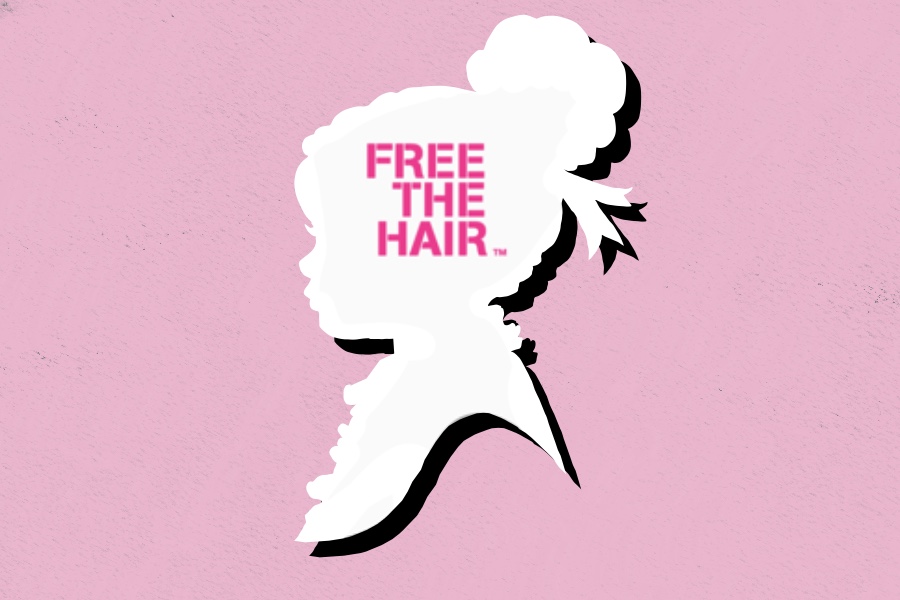Dr. Wendy Greene discusses the intersection between natural hair, civil rights
As part of the Bouchet Speaker Series, Dr. Wendy Greene covered the natural-hair justice movement.
January 27, 2022
From reporters to airport staff, Dr. Wendy Greene discussed how women of color were excluded from opportunities because they wore braids, twists, locs and other styles to protect their hair from damage.
Northwestern hosted Greene, a professor at the Drexel University’s Kline School of Law, Wednesday afternoon at The Graduate School’s event #FreeTheHair: Locking Black Hair to Civil Rights Movements.
Greene has published content included in the Creating a Respectful and Open World for Natural Hair Acts. These CROWN Acts are the first of their kind and aim to classify natural hair-based discrimination as racial discrimination and prohibit it. Greene is also the founder of the #FreeTheHair campaign.
“We celebrate and advocate the right for people of color to freely wear their hair as it naturally grows or in accordance with their personal choice,” the movement’s website reads.
Greene started her lecture with a presentation of the history of natural hair-based discrimination, which she said was used to hide racial discrimination following the passage of the Civil Rights Act in 1964.
She pointed to Deborah Renwick’s case in 1969 as a notable example of discrimination. Renwick, an air hostess for American Airlines, was suspended and fired because she refused to change her afro, Greene said. She said American Airlines determined the afro did not meet the company’s short hair guidelines, even though hers was short.
Greene cited a wide variety of other cases where people of color were discriminated against because of their hair.
“A more coiled hair texture served as a legal basis of racial exclusion and subordination,” Greene said. “(It) absolutely served as an indicator of our status in society and also serves as a barrier to employment opportunities”
Greene said officials have used hair discrimination to hide racial discrimination. Historically, she said many courts have concluded that hair-based discrimination did not violate Title VII because natural hairstyles were cultural, not racial.
However, Greene said discrimination against natural hair should not be separated from racial discrimination. She said white women with more eccentric hairstyles or curly hair are still favored for employment over Black women with their natural hairstyles, as standards for professionalism are rooted in Eurocentric ideals.
“When we think about race for the purposes of our civil rights protections, we really need to have a more expansive notion of race that’s not just limited to immutable or unchangeable characteristics with which we are born,” Greene said. “(We need to think about) characteristics that are historically or even presently, commonly associated with a particular racial group.”
Greene said individuals play a role in educating each other on respecting people’s individuality. She said that racial discrimination, stigmatization and subordination can be avoided by educating people in charge of creating workplace policies.
She added that these policies should center around helping people embrace their natural appearances.
“We want policies that are going to actually affirm someone’s freedom and their agency and autonomy to express themselves,” Greene said. “So possibly using new language (in these policies) that actually affirms our ability to show up in our workplaces and in our schools so we can show up in our most authentic ways.”
Greene’s lecture is part of the three-part Bouchet Speaker Series, a new program created this year in honor of Edward A. Bouchet, the first African American to earn a doctorate degree in the United States. The program aims to promote the values of diversity and scholarship that Bouchet embodied.
NU’s Bouchet Honor Society is a network of scholars who value academic excellence and collaboration. Associate Dean of The Graduate School Damon Williams said the program has 20 members. The deadline for its fifth cohort nominations are on Jan. 31.
“Because we are celebrating Dr. Martin Luther King Jr. this week, while lifting the justice, diversity and equity inclusion work of many scholars in the academy, we have pivoted to honor Edward A. Bouchet in our inaugural Bouchet Speaker Series,” Williams said.
Email: [email protected]
Twitter: @joannah_11
Related Stories:
— NU senior launches start-up to promote Black women’s self-love through hair care
— First Northwestern Black Hair Expo showcases vendors, product samples












